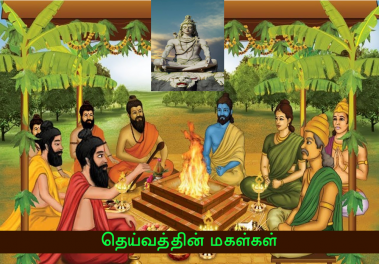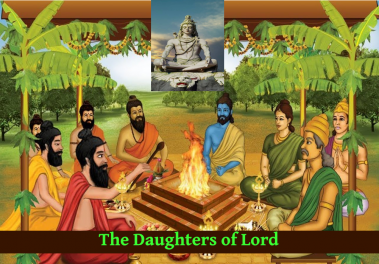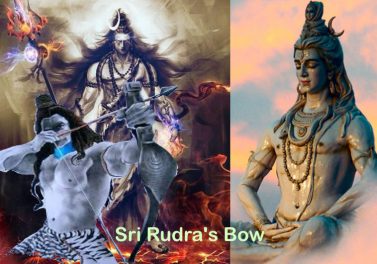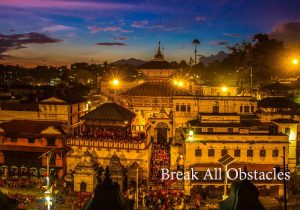Dispelling Destiny
Conversation With Aiya (8)
I was sitting with Aiya on a small platform on the banks of the river. Anand, my nephew was also with us. He is a young entrepreneur, who is yet to get a break in his endeavour for a profitable venture. He has been trying hard that I know, but for some reason, success seems a bit elusive, yet I am sure of his success someday soon.
Whenever I am in Trichy, walking along the shores of Cauvery is something I never fail to do. It gives me so much joy especially on few stretches along the banks of the river that I always find to be peaceful. On one side, there is the enormity of the mighty river and on the other, the sprawling flush green-fields of paddy, banana and sugar-cane; the field is almost always moist with brimming birds with the flurry of activities. The tall, straight and also some crooked coconut trees on the shore look as if they are there to watch over the stream. The dense summer shade of a huge banyan tree with its sloping branches touching the surface of the water is usually a place of momentary refuge to many passers-by; there, at the foot of the tree, is a lovely and lonely statue of Lord Ganesh, bearing further testimony of the inexplicable serenity around. That is why I never miss an opportunity to be at the side of the river.
It was a chance that I could meet Aiya and so we have decided to stroll along the shore. We had a brief walk before parking ourselves on a small platform near the banyan tree. With the breeze cuddling our face, we were simply soaking the atmosphere and watching the affairs of the world as mere spectators.
I used to swim across the river during my school days; those days, I had no fear to cross the mighty river. Anand reminded me of those days and asked.
“Uncle, are you game?”
I nodded quickly- “No, I am not so fit these days. You go ahead.”
Although I wanted to, I was not willing.
Aiya and I were watching as Anand was getting into the stream. I have seen him as a good swimmer. But these days, perhaps he too has mellowed down as I watched him entering into the river slowly and gently stroking his hands in the water.
‘Aiya!’ pointing to Anand I said “Here is a chap who has tried many routes to break into the business world. Despite all his good efforts, the break he is seeking still seems distant. Is it his fate that he is not able to get the chance he deserves?”
Aiya pointed out to the river.
“Look at that little kid; He is not able to swim against the current and struggling”.
I too noticed. An elderly man pulled the boy towards the shore. The boy did not seem to be shaken. On the contrary, he was busy preparing to jump again.
I noticed Anand gently swimming near the shore-end of the river.
I looked at Aiya again.
“No matter however one tries, it is the destiny that decides the outcome, is it not? At least, it seems like that. If our life is only shaped by destiny or karma or whatever it is, then are we not merely like a puppet in the hands of a puppeteer?”
Perhaps, my anxiety for Anand was reflected in the tone of my voice.
Aiya turned to me and smiled.
“It is indeed a big confusion to many, often wondering if life is already a scripted story or some history that we make as we go along! You said destiny…. In English the word destiny or fate is defined as some unavoidable power that will necessarily impact and decide our future… or something to that effect. I do not agree to this. I don’t think life is just a script of destiny. Our Sastras do not subscribe to such dictum. I don’t even know if there is even a word for destiny with same meaning in Sanskrit or Tamil.”
“What about words like vidhi, niyadhi, vinai, and uzh etc., Aiya.”
“These words do not mean what is being inferred by the word Destiny. On the contrary, these words refer to what is rightfully due. If we understand our scriptures correctly, then we will know that life is not simply a script written by destiny”.
Aiya paused for a few seconds and then asked.
“You also said karma, Is it not!”
“Yes Aiya. I have read about the law-of-karma and how it decides our life, in this world, and thereafter too. It is all very confusing. What about our freewill, our efforts! Is it only a random chance that something happens or not?”
Aiya smiled.
“I agree with you… these words may be very confusing sometime. Even the learned and well-versed with the scriptures are sometimes deluded.”
After a momentary pause, Aiya asked.
“Have you read the epic Mahabharata?”
“Some part of it. I know the story, but not necessarily the true import of it”.
“Well…. I asked you just to draw some memorable teaching which relates to your question.”
That was when Anand came up to take a break. He was soaking wet; as I was giving him the towel, I signalled him to sit down to listen to Aiya.
“Draupadi is a fabulous character and central to the story of Mahabharata. She is the most grieving person, wounded by the misdeeds of Kauravas and the events of her life. Yet she is also the most gifted person with the insights of divinity and true wisdom. When the Pandavas had to wander in the woods, in complete anonymity, once Draupadi was with her escort Yudishtra who is known for his righteousness. She pondered how was it that he and his family were to suffer in spite of his honest life, while Duryodhana and his clan, who were not pursuing righteous path were able to enjoy the luxuries of the kingdom. Where was the justice?”
I intervened, “Was it mainly due to their karma?”
“That is what Yudishtra also said. In the epic, he gives a long lecture on the law-of-karma to Draupadi. But there was nothing that Draupadi did not already know. It was only due to overwhelming grief, Draupadi was momentarily deluded and so by pondering, she had rekindled the wisdom in the Pandavas. In fact, subsequently, it was Draupadi who taught Yudishtra how to handle the law-of-karma in this world.”
“How do we handle Aiya?” I was curious.
Aiya looked intently at Anand and asked.
“If our goal is to reach the other side of the river, and if we simply sit here and wish, can it happen?”
Anand hesitated for a while before saying “No, absolutely not. We need to swim across the river. Wishing is not enough. We need to take effort.”
“Exactly! We need to take effort… the right-effort. It is called the prayatna. In Sanskrit, yatna means effort and prayatna means great or good effort. That is what we need.”
“Aiya, if I don’t know swimming, I won’t venture. But perhaps look for someone to carry me or wait for a boat”
“Perhaps! That too is a prayatna! You have to put prayatna for things to happen.”
“Agree Aiya.”
“Let us assume that you are able to swim and have decided to plunge into the river… then you are exercising your freewill.”
“But if I do not want to do, I will not do.”
“That is also your freewill. It is the freewill that triggers action. If you do not decide to act, there is no action. There is no karma.”
“Aiya, are you saying my freewill is the cause of karma.”
“No! I am simply saying that freewill is the foremost trigger for karma. We all have the power to decide, to do or not to do. Recognizing this power-to-will is the most important qualification for success.”
Aiya turned to me and said.
“Recall what Bhagavan Krishna tells Arjuna when he was not exercising his freewill either to fight or to withdraw; the Lord indicates that the adhikAritvaM or the power to will is with each one of us and this should be exercised before deciding to act. That is freewill, which is the trigger for action.”
Anand responded.
“Aiya! I always willingly do things and put necessary efforts, still I am not able to achieve my goals!’
I was glad to see him opening up to seek a different perspective of his situation.
But he also quickly added, as if not wanting to dwell on his personal pursuits.
“I mean the swimming. If the current is very fast, we may not reach the same point where we want to go. So our efforts cannot always materialise!”
Aiya replied.
“Yes! Your prayatna or good effort is the foremost and necessary factor. But there are other factors to consider. Even if you are a good swimmer, the force of the stream will definitely drag you far off from your destination.”
“Exactly, there is nothing I can do about it” said Anand.
“No” said Aiya.
“When you put your prayatna, you also have to be prepared for other forces of influences. You have no choice but to encounter the fleeting force of the river as you swim. The current of the stream may drag you in certain direction. Similarly know the forces that influence your pursuits are due to the results of your previous karma, accumulated over many births.”
“What is it?”
“Well, every action leads to some outcome. And although the level of impact may vary, every outcome has an effect on the doer.”
“Yes!”
“So when you perform an action – which is called karma – there is going to be some result of that action and some impact on you. It is called the karma-phala or the fruit of action”
We waited for Aiya to continue.
“Our Sastras say that the karma-phala is of two types, one that is experienced as a direct consequence of the karma, this is called drishta-phala or recognizable impact. When a thief is caught, he is imprisoned. We can easily correlate his action of stealing to the effect of punishment. It is a drishta-phala.”
“What is the second type of karma-phala?”
“That is known as adrishta-phala or unseen impact. The impact that is due to us from our actions, may not occur to us immediately, but may reveal themselves somewhere, sometime in the future, or even in the next births. That is why when the adrishta-phala occurs we are unable to correlate to any known action of ours and simply label them as misfortune or good fortune.”
Aiya then quickly added.
“Remember, karma-phala can bring both positive impact and negative impact and the impact can be insurmountable or totally negligible. The point is that there is always an impact.”
“Aiya, where and how these impacts are accumulated? How are these brought to fructification?” I asked.
“Well, those are different subjects to discuss. Let us just assume that the responsibility for accounting all our karma and ensuring due distribution of karma-phala is with God. It is a major responsibility and that is why God is also known as the karma-phala-datta, the One who justly distributes the accumulated fruits of actions to all.”
Anand asked.
“So, if there is a setback without any known reason due to my action, then, should I take it as my karma-phala?”
“Yes, so also are the rewards and opportunities in your life, if they show up without your efforts.”
“So, I cannot avoid the bad impact of my karma-phala?”
“No! But once you understand the Law-of-karma, you are prepared to accept whatever life throws at you, and instead of blaming others, you will find ways to cope and overcome the challenges. ….. Like pushing against the upstream in the river!”
Anand seemed to be clued-on.
“Aiya, I do not need to fight against the upstream. I can swim slightly off to my goal! Perhaps start swimming from some distance away to leverage on the flow of water to reach the point where I need to go on the other side.”
“OK, so?” Aiya paused with a provoking smile.
“That means, the current which takes me away from the goal, can instead take me towards the goal. I am able to manipulate the effects of the current – in your metaphor – the karma-phala?”
I was really pleased with Anand’s engagement on the subject. I was watching.
“Absolutely!” said Aiya.
“Once you realize that your effort alone cannot take you to your goal and you also accept the unavoidability of impeding karma-phala, then you are indeed in a better position because you can do something about it.”
“What can we do?” I could not resist.
Aiya looked at Anand.
“Like you just now said…. You may approach the river from different location. You may wait for someone to carry you. You may decide to wait for a while for the current to calm down! All these are knowledge, the ways and the means to deal with the unknown – the karma-phala. So you need to take the help of those who can give such knowledge and strength.”
Anand intervened.
“I have tried to cross the river when it was flowing in full speed. I recall, I was in the middle of the river. My eyes were closer to the brim of the wave and that really scared me! I could not see the shores. The water suddenly looked like a vast sea. My legs were motionless. It took me a while to recognize where I was and to compose myself to safely swim across. It was a frightening experience.”
I don’t know why Anand said this, but it drew a comment from me.
“So no matter, how careful, how clever our preparation etc., in the midst of our action, we get stumped by the course of events. We get confused; we become hopeless and full of despair.”
I continued to bring back the context of swimming.
“I have read about great swimmers who were also swept away sometimes, simply because they had lost their composure.”
“That happens. Many a times, our strength of effort may not match the overwhelming force of the karma-phala. If we are not prepared, we get stumped. That is why we must seek help from others.”
“From who”
“The best is to seek the help of the karma-phala-datta” the God Himself. He is the fairest of all.”
“You mean through prayer?”
“Yes… it is known as prartana, a plea for help.”
“How can prayer help? We need action. When we get struck in the extreme current of the river, don’t we need the physical power to wade through to safety? We need action, what can prayer do?”
“Why do you think prayer is not an action?” – Aiya asked and then continued.
“Prayer is an action. It is karma. Sastras say prayer can be a kAyaka-karma or a physical act like performing puja, vAcika-karma or an oral act like reciting the glory of God and mAnasa-karma or mental act like meditation. In whatever way, when we offer our prayers, not just at the time of despair but at all times, then even if the merciful God is unmoved by our prayers, the very act of praying which is a good karma will lead to positive benefits.”
There was a pause before Aiya continued.
“The drishta-phala of prayer brings a positive change in our nature, in our temperament; we become more gentle, focused, poised, stable and balanced in our outlook. Because of that, we will be able to handle situations calmly… which is very important when we are struggling to wade against the forces in our pursuits.”
“What is the adrishta-phala of prayer?”
“It is the grace of god. We must understand this. Grace of god is only available through good karma. It is also called punya. Grace of God is the demand on Him to bestow His benign powers on us. It is the result of our prayers. It is adrishta-phala. That is why, even the evil demons were able to achieve great boons by prayers, penance etc. It is the Law of karma.”
“Then can we simply rely only on Prayers, and not putting any effort. Prayers should give us all the necessary adrishta-phala!”
“That is not ordinarily the case. We need to have all three – putting prayatna, accepting karma-phala and preforming prartana for the ability to counter all impediments to our goal. These are the right ingredients for meaningful and successful pursuits”
Aiya continued.
“PurAnas may show legends of devotees who have achieved great things by simply offering prayers to God; but these only mean that such devotees have already accumulated so much of good karma-phala (punya) in their previous births, to the extend that there is no additional effort needed to accomplish the desired goal. As we are not aware of what we have accumulated as our karma-phala, it is necessary that we own-up to all three: prayatna, prartana and the acceptance of karma-phala.”
“Does it mean that the PurAnas exaggerate?”
“They may dramatize the narratives, but only speak the truth. For example, our discussion this evening is only a glimpse of what all have been revealed in our scriptures and PurAnas about the law-of-karma. There is so much to learn.” – Aiya said with conviction.
I suddenly remembered about Aiya alluding to Mahabharata earlier.
“Aiya, you were mentioning about Mahabharata”.
“Yes, although Yudishtra explained the law-of-karma to Draupadi when she was lamenting the dire situation, it was actually Draupadi who poignantly summarized to Yudishtra on how to handle the law-of-karma and the ordeals of life. She points out that in this world some say everything happens only by chance; others say everything is only ordained by the God and some others say everything is due to our efforts only. But all three causes are responsible for all that happens in our lives.”
“So what do we take from this?”
“Firstly exercise your freewill intelligently. That requires you to think deeply, seek advice on your goals and the means, determine the time and space of your action then act precisely!”
“Is that it?”
“Yes, that’s all to it. Then leave the outcome to the God; He is the karma-phala-datta so whatever is the outcome, accept it reverentially as the prasAdam or the gift of God.”
“OK, then what is the role of God besides ensuring what is due to us is given to us?” I asked, hesitantly.
“This is the question even the great knowers of Veda sometime asked due to their delusion. Do you know the story of Daksha? He was a great scholar of all scriptures with certain understanding of the Law of karma; to him, God is simply there to dispense the dues according to one’s karma. So Dakhsa decided not to invoke or pray to God; but his efforts were futile, leading only to destruction.”
“Why?”
“Being a karma-phala-datta is not maintaining a mechanical role but a truly merciful role. Our capacity is limited. In our life, we cannot handle pain or pleasure that is upon us with far greater intensity. We will simply break as our capacity is quite limited. That is why the merciful God decides and distributes what is due to us as karma-phala in correct doses and schedules in order for us to handle and not overwhelmed. That is why, no matter what the grief or despair and equally joy or exhilaration that we face in our life, we are able to cope and eventually handle successfully.”
“Aiya, if God cancels the bad-impact of karma-phala because of our prartana, does He not violate the Law of Karma?”
“No, He neither removes nor alters the karma-phala due to us; but He can make such that you may hardly impacted by it. For example, He can alter the time and space dimension of their impact, so that a potentially worse karma-phala may be expended as a short bad-dream. When we earn the grace of God, all is possible!”
After pausing for a minute or so, Aiya said.
“So just do all your actions in the name of God. That is the best form of prayer. Don’t we use the phrase work is worship!”
“Yes Aiya. Indeed, we need to exercise our freewill, act diligently, treating work as worship and accepting the outcome as the gift of God. It is still a tall order for me…!” – I submitted.
Anand asked again as if to reassure.
“Aiya, that means, whatever is the outcome of our action, we must accept.”
“Yes, with absolute reverence and total acceptance, then you will see that your life becomes joyful and every act is a cheerful sport – just like these lads playing in the river.”
Aiya and I stood up to walk back home.
Anand chose to remain there. He said, “Uncle, please go ahead. The current in the river may be bit calm now; I want to swim across”.
He seemed determined.
Aiya was walking in front. The evening Sun was glaring over his head. I was following him with a heart full of inexplicable joy.






